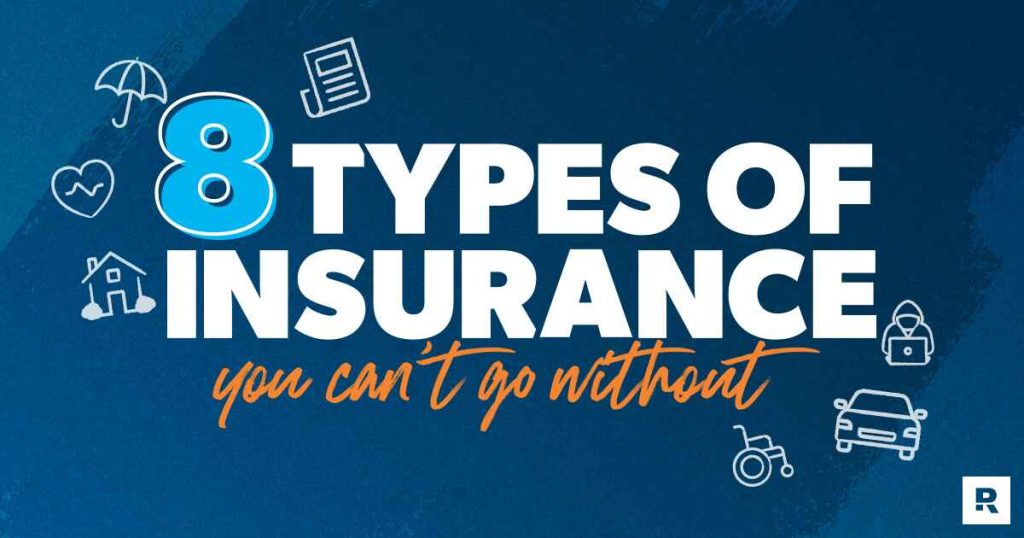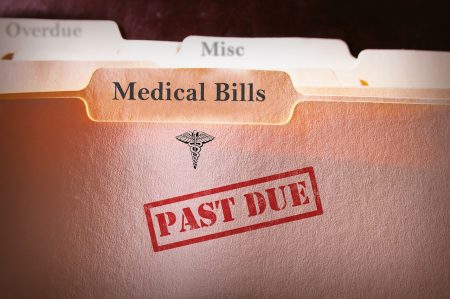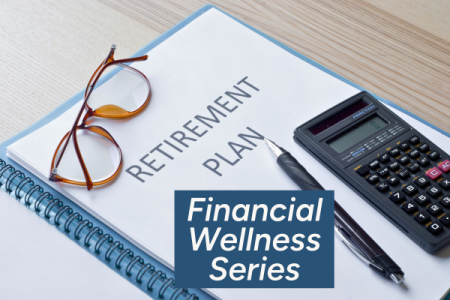Insurance . . . it can feel complicated and confusing. You just want to make sure your family is taken care of, but then you start running into a bunch of insurance jargon—and all the options start running together. It seems like the insurance companies make it as difficult as possible to make sure you have the right coverage without paying more than you need to. Oh, and don’t forget all the insurance gimmicks and rip-offs you have to watch out for!
It can all be a little bit overwhelming, huh? But don’t worry. Even though insurance can be hard to understand, you can still make smart, informed decisions. You just need to know which types of policies you need.
So, let’s go over the eight types of insurance you can’t go without. That way, you’ll be prepared to make the best choices for you and your family. And don’t worry, we’ll break everything down and make it all easy to understand!
- Insurance is all about transferring risk you can’t handle yourself—it’s not a savings or investment plan.
- Make sure you have plenty of liability coverage through your auto and homeowners insurance policies.
- Getting life insurance is a must if someone else depends on your income, but only purchase a term life policy—not whole life.
Types of Insurance Coverage You Need
Here are the eight types of insurance coverage you need:
- Auto insurance
- Health insurance
- Life insurance
- Homeowners or renters insurance
- Long-term disability insurance
- Long-term care insurance
- Identity theft protection
- Umbrella policy
Before we break down all those different types of insurance, here’s something important to remember: The purpose of insurance is to transfer financial risk you can’t handle yourself to an insurance provider. It should only serve as shield for when something bad happens that, without a good insurance policy, could wipe you out financially—like a hospital stay, a house fire or getting sued after a car accident.
That means you should not use insurance as a savings plan or an investment strategy. It also means you don’t need insurance for smaller expenses you can handle yourself, like routine visits to the dentist or eye doctor.
Alright, now let’s dive into the list!
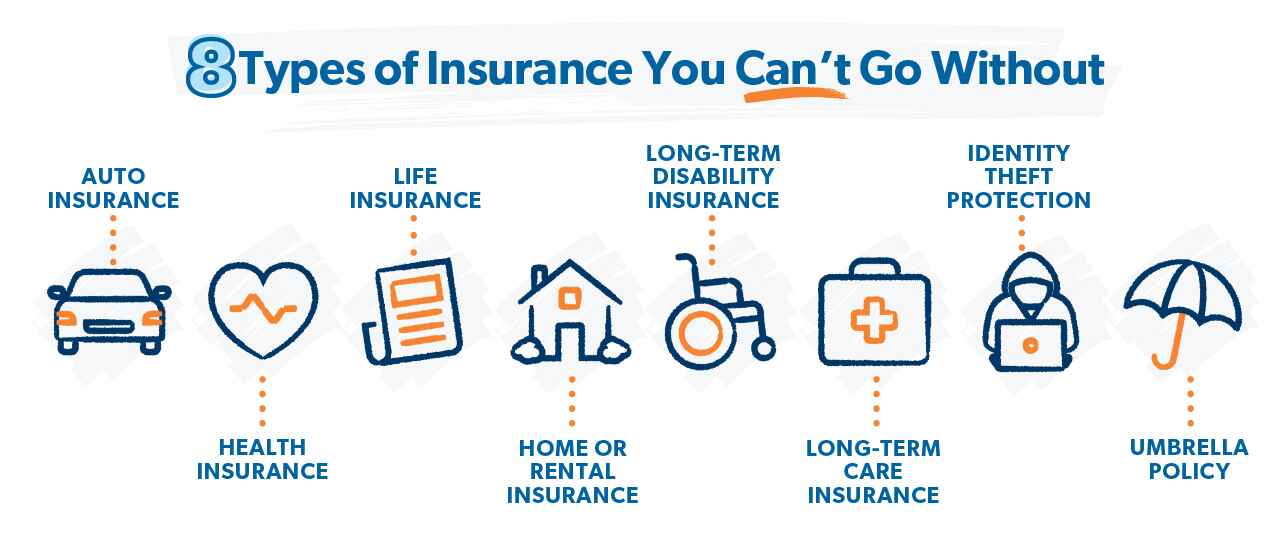
1. Auto Insurance
You probably didn’t need us to tell you how important it is to get auto insurance—chances are, your state requires it anyway. But there are a lot of different types of protection in the auto insurance world, and you need to know which ones to include in your policy. These are the three big ones you need:
- Collision: If you get in an accident that’s your fault, collision coverage pays for damages to your car.
- Comprehensive: This level of insurance covers damage to your car not related to wrecks—like theft, fire, glass breakage, flooding and hail damage.
- Liability: If you’re responsible for an accident, liability coverage takes care of the other guy’s car and any injuries or property damage caused by the collision—and legal fees if the other guy decides to come after you and sue you for some reason. You need at least $500,000 in liability protection (it’s usually only a few bucks more each month).
You should also consider adding these three areas of protection to your auto policy if they’re available in your state. (The extra costs are minimal in most cases.)
- Personal injury protection (PIP): This covers hospital bills, medical costs and lost wages if you get injured in a car accident—basically, any gaps your health insurance doesn’t take care of. PIP coverage is only available in about half of U.S. states, but it’s usually pretty cheap to tack it onto your policy if you have the option.
- Medical payments coverage: Basically, medical payments coverage (or MedPay) is a weaker version of PIP. They both cover pretty much the same types of expenses, but PIP provides stronger coverage with higher limits. MedPay is a good option if PIP isn’t available in your state.
- Uninsured or underinsured motorist coverage: As you probably guessed by the name, these are coverages that protect your car if you get in an accident with an uninsured or underinsured driver and the accident is their fault. Both types of coverage are typically bundled together, and some states require them.
2. Health Insurance
Yes, health insurance is confusing. Yes, it’s expensive. But you need it. Why? Take it from Shannon B., a member of our Ramsey Baby Steps Community on Facebook:
![]()
Do you have the right insurance coverage? You could be saving hundreds! Connect with an insurance pro today!
“My dad, when he was in his mid-40s, had a very minor heart attack. Come to find out he needed quintuple bypass, because our family is ‘blessed’ with the high cholesterol gene. His bill after the surgery, after the hospital stay—and he was only in the hospital for about five days—was over $100,000.” Woah!
Luckily, Shannon’s father had a good health insurance policy in place. And because of it, he only wound up paying about $800 for the surgery.
That’s the reason you get health insurance. See, you don’t get it to cover every little dinky thing that happens in your life. You don’t need coverage for hangnails or the sniffles—you can handle those costs on your own. But what about if you have a heart attack, even a minor one? Or you have to get your appendix out and spend a weekend in the hospital? Or, heaven forbid, you get diagnosed with cancer and need seven weeks of treatment that costs $400,000? Yep, that’s what you need health insurance for.
It’s sad, but a lot of people get caught in one of those situations with no medical policy in place. It’s why 67% of bankruptcies are at least partially caused by medical debt.1 Don’t let that be you! Make sure your health insurance policy provides the coverage your family needs.
If you’re worried about the cost of health insurance, there are several things you can do to make it more affordable—like using an employer-sponsored plan, raising your deductible or taking advantage of discounts your insurance company offers. And here’s one more: participating in a health share plan (which technically speaking, is not a form of health insurance). The thing is, health share plans tend to be far more affordable than typical health insurance. In fact, there’s a health share plan we love—Christian Healthcare Ministries (CHM)! They’re a RamseyTrusted partner serving thousands of people nationwide.
If you want to save some money on premiums (and you have a fully funded emergency fund), look at a plan with a higher deductible. A high-deductible health insurance policy will have lower premiums and give you access to a health savings account (HSA), which is a super sweet deal.
3. Life Insurance
There are a lot of myths out there about life insurance, so let’s set the record straight. Life insurance has one job: to replace your income if you die. (Doesn’t that make it death insurance?)
Like we talked about earlier, insurance should never be an investment product or a savings plan. But that won’t stop tons of life insurance companies from offering you terrible whole life policies (sometimes called “cash value”) that come with super expensive monthly premiums. They combine a life insurance policy with a savings or investment plan that grows at the rate paint dries—certainly nowhere close to a good mutual fund or index fund. That’s a terrible deal!
So, while you do need life insurance if someone relies on your income—like children or a spouse—you don’t need a whole life plan. Instead, take out a term life policy for 10–12 times your annual income. With term life insurance, there are no smoke and mirrors or confusing financial maneuvers. It’s simply a life insurance policy that provides a payout if you die while the policy is active.
Now, unlike whole life insurance, term life policies are only active for a set term, usually 10–20 years. But if you spend those 10–20 years working hard to get out of debt, pay off your house early, and build wealth through investing, you won’t have to worry about life insurance anymore when the term ends. Why? Because, at that point, your family will be in good shape financially even if something happens to you—you’ll be self-insured thanks to your hard work.
4. Homeowners or Renters Insurance
Homeowners insurance provides financial protection for your home and personal belongings. It’s really important to have the right amount of coverage since losing your home without a backup plan would mean taking a massive financial blow—one you can’t handle on your own.
A good homeowners insurance policy will include the following types of coverage:
- Extended dwelling coverage: pays to rebuild your home
- Personal property: pays to replace your personal belongings
- Liability: covers injuries and damages that happen on your property
- Additional living expenses: reimburses your living expenses after the loss of an insured home
You’ll also want to make sure you add a flood or earthquake insurance rider (or a separate policy) if you live in an area where either of those are common—almost no homeowners insurance policies cover floods or earthquakes.
If you’re renting, that doesn’t mean you don’t need insurance! Your landlord’s insurance policy only protects the apartment, house or condo itself—they can’t legally insure your personal belongings. That’s why you need to have renters insurance. A $20,000 policy is enough coverage for most people.
Just like a good homeowners insurance policy, your renters insurance should include personal property, liability and additional living expenses coverages. Your landlord’s policy will cover the extended dwelling.
The value of your homeowners insurance policy will not automatically increase as your home’s value goes up. Make sure you go back to your insurance agent and increase your policy’s coverage amount anytime the value of your home increases.
5. Long-Term Disability Insurance
The best way to be financially prepared for a short-term disability is to save an emergency fund big enough to cover 3–6 months of your typical expenses. If you ever get sick or injured and have to take time off work for a few months, those savings can fill in the gaps until you get back on your feet.
But when it comes to disabilities that keep you from working for more than just a few weeks or months, the best way to be financially prepared is to get a long-term disability insurance policy. And since 1 in 4 of today’s 20-year-olds will become disabled at some point before their 67th birthday, that’s a protection you can’t live without.2
The price of a long-term disability policy is typically around 1–3% of your annual income, though the cost will largely depend on the physical risk associated with your job. If you work in an office and sit at a desk all day, you’ll pay less for disability insurance than, say, a high-rise window washer or a logging worker who uses dangerous heavy machinery every day.
You want a policy that’ll cover 60–70% of your annual income. These days, most policies are set up to pay you for five years after you’re declared disabled.
6. Long-Term Care Insurance
Good long-term care insurance coverage will take care of expenses for assisted living, in-home care and nursing home care if you can’t look after yourself. And no, Medicare doesn’t cover the costs of long-term care. That’s why getting your own coverage is an absolute must for anyone over 60.
Why? Because 70% of Americans over 65 will wind up needing long-term care and the average annual cost for a private room at a nursing home is nearly $110,000.3,4 Holy smokes! For lots of folks, those insane costs wind up coming out of their retirement accounts or other personal savings—meaning they wipe out a huge portion of their net worth. If you’re married and your spouse outlives you, that’s a recipe for disaster.
Instead of leaving yourself vulnerable to a situation like that, purchase a long-term care insurance policy when you turn 60. It’s not cheap, but it is worth the cost in the long run mathematically.
Never bundle long-term care insurance with life insurance. Chances are, the insurance company will add a whole bunch of junk on the edges of the plan that’ll cost you more. It’s a rip-off!
7. Identity Theft Protection
While identity theft protection isn’t technically an insurance product, it’s still really important to have in place. Why? Because identity theft is becoming more common each year (the Federal Trade Commission got 1.1 million reports of ID theft in 2022), and you’ll have a big mess on your hands if it happens to you.5
Even though you aren’t responsible for money that’s fraudulently spent or taken out in your name, you will have to clean up the damage—which means fixing your credit report, dealing with banks, and jumping through legal hoops. But if you have a good ID theft protection policy, your provider will assign a counselor to your case to clean up the damage for you.
So, make sure you get a policy that offers restoration services, not just credit report monitoring—something you should be doing yourself anyway.
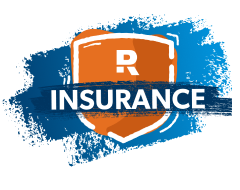
Get trusted coverage that fits your budget.
When you work with a RamseyTrusted pro, you can feel confident knowing they’re going to find the best policy for you at the best price.
Explore Your Options
8. Umbrella Policy
An umbrella policy stacks on top of your homeowners and auto insurance policies to add an extra layer of liability protection for you and your assets. Getting one is a good idea for anyone with a net worth of at least $500,000.
Why? Because, when you build wealth, you put a target on your butt. Yep, it’s true. Some folks will see your financial success as an opportunity to get something from you. And in the lawsuit-happy world we live in, you need to be cautious about that.
Imagine this scenario: You gently bump into the car in front of you on the highway and, though the accident was your fault, neither car was damaged beyond a few scratches and scuffs. But then the other guy, seeing this as their opportunity to cash in, gets out of the car and starts acting like they have a major back injury. Then they turn around and sue you for more money than your auto liability policy will cover. Bad news.
That scenario may seem farfetched, but it’s more common than you may think. Getting an umbrella policy is the best way to play defense against it and other kinds of situations that put your wealth in jeopardy. Especially since they’re so affordable—typically just $200–300 annually for $1 million in coverage—umbrella policies are 100% worth the investment.
|
Type of Insurance |
Do you need it? |
|
Auto Insurance |
✓ |
|
✓ |
|
|
✓ |
|
|
✓ |
|
|
Health Insurance |
✓ |
|
Term Life Insurance |
✓ |
|
Whole Life Insurance |
NO |
|
Umbrella Policy |
✓ |
|
Homeowners/Renters Insurance |
✓ |
|
✓ |
|
✓ |
|
✓ |
|
|
✓ |
|
Long-Term Disability Insurance |
✓ |
|
Short-Term Disability Insurance |
NO |
|
Long-Term Care Insurance |
✓ |
|
ID Theft Protection |
✓ |
Do You Have the Right Insurance?
Take the coverage checkup to find out what insurance coverage you should add, tweak, or drop based on your individual needs.
The Best Way to Get the Coverage You Need
Now you know exactly what kinds of insurance coverage you need—and which traps you should avoid. So, what should you do if you don’t have one of the policies on this list? Get connected with one of our RamseyTrusted insurance providers.
They’re independent agents and brokers who aren’t tied to a single insurance company. That means they can shop a bunch of different companies to get you the best deal on the market. Plus, we’ve vetted them to make sure they’ll serve you with excellence and help you make the best decisions for you and your family.
Read the full article here



